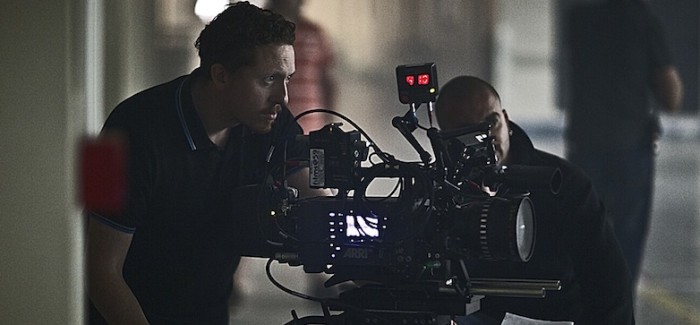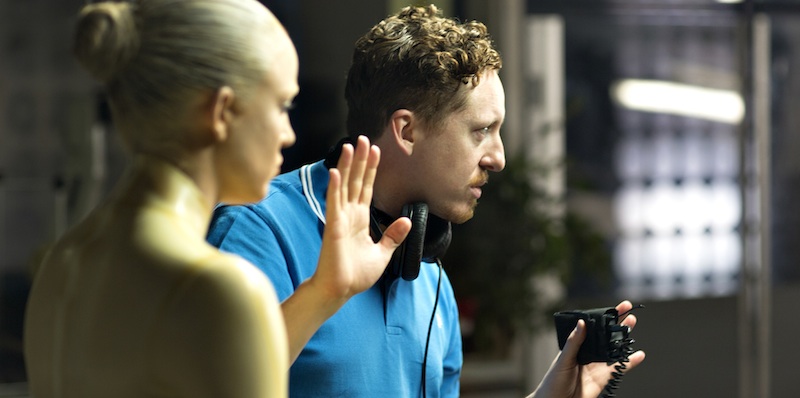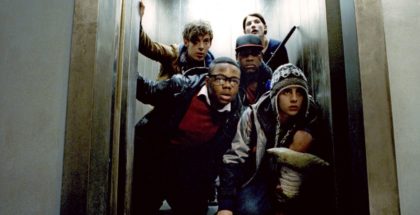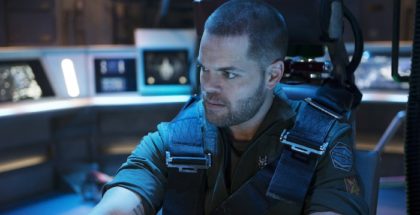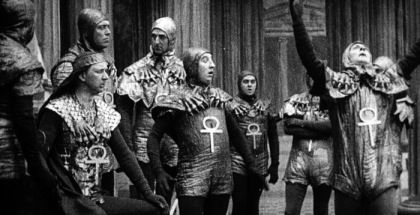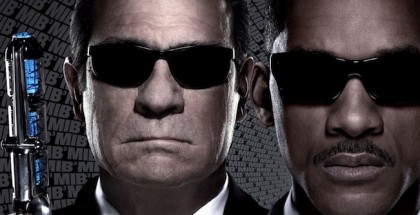Interview: Caradog W. James, director of The Machine
David Farnor | On 30, Mar 2014
Indie Brit flick The Machine came out in cinemas and on video on-demand last Friday. It’s a fascinating film, which tackles everything from creation and humanity to technology and the ethics of the modern military (read our review here).
One week later, the ambitious thriller is about to come out on DVD and Blu-ray – and has spent the whole of its release in the iTunes Top 10 Films. We chat to its director, Caradog W. James, about casting Toby Stephens and Caity Lotz, making hard science fiction on a budget, and building killer robots.
Firstly, congratulations on The Machine and its great first week. Are you excited or nervous about the audience response?
I’m over the moon with the response to the film. We’re currently number two in the UK iTunes Chart – every other movie in the top 10 is huge. They’re studio films like Gravity, Hunger Games 2, Thor and Escape Plan. Some of the films that we’re beating have literally a hundred times our budget!
We’d also like to ask why The Machine? We mean, why build one in the first place? Didn’t you realise that creating an artificially intelligent robot always ends in Bad Things Happening? WHY, CARADOG? WHY? DIDN’T YOU SEE THE SCIENCE FICTION FILMS?
Hey, HEY! Calm down. My machine is the goody. She’s the most sympathetic and innocent character in the whole film.
(Calms down) It’s obviously a familiar rule that any robot on film will generally go berserk and kill everyone, but what we like about The Machine is the way it’s not really that at all. Was that intentional?
I’m a huge fan of technology, I just don’t trust the governments that have all the money and resources to develop it. GPS is wonderful when you’re lost, it’s only Governments that would think to use it to guide a smart bomb. For that reason I didn’t want to make the technology in the film inherently evil. I wanted to use the film to discuss how we let our leaders employ technology for their own ends.
The sentient machines are coming, it make take a 100 years but they’ll arrive, and what lessons, as their creators and parents, will we teach them? The answer to that question may decide the future of our species.
The Machine has a hard sci-fi focus, which doesn’t always feel so common these days either…
What’s crucial for filmmakers, I believe, is that you learn the craft from your influences (how a shot was achieved, why a shot makes you feel a certain way) but that you always take inspiration from real life for the stories that you tell. So there are lots of shots and lighting choices in The Machine that are heavily influenced by the films that I love (including Bladerunner, but also films in other genres like Goodfellas and Psycho), but the story was completely inspired by research and interviews I had with real people who are actually building thinking Machines. One of these interviews was with an A.I programmer at the MoD. He was in the process of mapping a chimp brain and our conversations about the nature of intelligence and the methods that the MoD are using to help their intelligent machines interact with and understand the world, were key in the genesis of the story.
A good example was an article that I read about how programmers were exploring the similarities between the methods used to teach A.I how to process the world and the methods used to help Autistic kids process stimuli that can overwhelm them. After reading that article I put out an advert and went to meet some families with autistic kids and those conversations lead to me giving Vincent a child with Rett Syndrome – which became the emotional core of the movie. I would never have made those choices if I’d just regurgitated the stories of movies that I loved.
The choreography of The Machine is good. So are the visual effects. We had this laptop years ago, an HP laptop – bear with us – and it was covered in these blue lights. You know, because back in the olden days, everyone thought that blue lights were futuristic. You have that look a lot in The Machine – the retro HP laptop look, if you will. Was that a style/tone you were going for?
When I interviewed the guy working at the MOD – who was actually building A.I. weapons – I asked him what their secret labs looked like. He explained that they are pretty run down, with old wallpaper from the seventies, furniture from the 1950’s and then, in the corner, you’d see a one of a kind supercomputer. I loved that idea of old and new clashing, it made much more sense to me than the sterile chrome world depicted in most sci-fi. So that was the inspiration for the “retro” look of The Machine.
The visual effects are really good, but there’s this physicality you don’t get from many modern CGI-fests. That seems to mainly come from Caity Lotz’s excellent performance. She did her own stunt work, is that right?
Caity Lotz is a very physical actress, she’s a martial artist and a dancer and did all of her own stunts in the movie – including a naked backflip in a subzero hangar! We tried to always blend prosthetics, performance and CGI together so the audience is never completely sure which is which. In my experience you always need something real, some aspect of the shot that is photographed, to deliver the best result.
Toby Stephens is also great…
Toby was incredible. He had a very difficult role to play because Vincent is so cold and introverted – so much of his character is operating beneath the surface. A less confident actor would have worried about the Machine stealing his scenes but Toby is so accomplished and relaxed he constantly amazed me with the subtle and precise character choices he made. Both Toby and Caity were so hardworking a prepared during rehearsals that by the time we got to set we were really able to play around with scenes and have fun. I had space to really be ambitious with the lighting and camera moves because I knew that they were always going to deliver a great performance.
Toby and I talked a great deal about making Vincent more than just a cliched hero; we wanted to portray a flawed man dealing with incredible sadness in his life. We wanted to portray a very guarded cold character who slowly reveals his admirable motivations and inner warmth as the film’s story unfolds.
How early did he (and Caity) get on board? Did you have either of them in mind to begin with?
We must have seen over a hundred actresses for the role and the reason that we chose Caity was that she played the humanity of the machine rather than the emotionless cold depiction that has become such a cliche. I was blessed with a brilliant cast all round. Working with Denis Lawson was also incredible. Local Hero is one of my all time favourite films and when Denis agreed to play Thomson I couldn’t believe that I was actually going to get a chance to work with him! During the edit Matt Plass-Mills (the Editor) and I were constantly discovering very subtle and interesting elements that he’d used to express his character.
The supporting cast were also a blessing. Pooneh Hajimohammadi who played Suri and Sam Hazeldine who played James were both awesome. They both knew their characters so well and had done so much prep work – Pooneh spent time researching by interviewing and working with blind people (her character was blind before her eye and brain implants), as well as interviewing female soldiers – and Sam met some special forces soldiers. They knew the characters better than I did!
How much does having an established name like Toby involved help with securing funding for the film? Or, if the money was already in place, does it help with attracting an audience/distributor?
John Giwa-Amu (the Producer) and I had already raised the budget from the private sector. We spent a year traveling round the country pitching the movie to rooms full of high net worth investors. Like the dragon’s den – only we had to convince 200 hundred of them! So we didn’t need a name actor like Toby to raise the money. Where an actor like Toby is invaluable, is because of his talent. When you have a low budget you don’t get very much time to make the film – we only had five weeks – and Toby, because he’s such a seasoned and talented actor, was able to deliver an incredible performance despite the limited time we had.
So Toby helps with distribution because his performance helped the film become a quality piece of sci-fi that can connect emotionally with an audience.
How did you find working with your budget limitations? Was it liberating? Or a challenge?
A key part of moving from being a screenwriter to becoming a feature director was meeting John Giwa-Amu (Producer) and starting Red & Black Films with him. Film is a very complex and convoluted business and although having a great screenplay helps, you also need great collaborators. John is a brilliant creative producer and also fantastic at spotting talent, putting the deals together and raising money
Getting finance for the film was really tough because people didn’t believe that we could make the film for our budget – which was less than a million pounds. So John and I had to work really hard to convince them that we could do it. There were a couple of key factors that helped, the Film Agency For Wales supported us to make a promo which was full of CGI and capture the sleek visual style of the film, and also Ali Pour, a Welsh self -made millionaire and passionate supporter of the arts, decided to invest in the project along with a whole group of private investors.
The main difficulty with the shoot was that John Giwa-Amu and I had never made such a complex film before. Every day had scenes full of stunts, specialist makeup, prosthetics and CGI. We meticulously prepared for months before the shoot. I’ve always storyboarded and carefully planned my shoots, because on short films you have to in order to make them on such low budgets. For The Machine I worked day and night to plan as much as possible. I gave every HOD a look book of visual references so that we were all on the same page.
There’s a sense now that all this science fiction is gradually becoming science fact… Machine implants for soldiers and so on… To be frank, Caradog, it has us a little terrified. DIDN’T YOU SEE THE SCIENCE FICTION FILMS? WHY, CARADOG?
I’m telling you, it’s gonna happen. The Machines are coming. My only hope is that if we’re nice to them they might be nice back.
I suspect that before strong A.I arrives we’ll all be part-machine anyway. Google Glass is just the start. Soon there will be processors that you can clip behind your ear to give you a better memory. It won’t be long before you can get a processor connected to the base of your brain that will enable you to speak every language on the planet. I’d have that operation, if it were available, and I’m sure it would quickly become common and accepted. Once these medical advances start, the boundaries between man and machine will soon become very blurred.
The robotic soldiers in the background of the film talk to each other in these scratchy, static growls, almost as though they’re starting to form their own civilisation.
Originally, the soldiers improvised their secret digital language but I could tell that they were struggling with it. I knew that the language had to have a structure to it, so the actors could believe in it – and ultimately the audience could believe in it too. It couldn’t be a language that people were familiar with because I didn’t want anyone to be able to lip read it. Pooneh Hajimohammadi, who played Suri (the leader of the revolutionaries), is Iranian and she offered to translate all of their lines into Farsi – and so that’s the basis of their digital language in the film, which was obviously then heavily manipulated in post
Machine 2 will be about the new civilisation these augmented soldiers form – it will be very cool.
So what’s next for you?
Next up for John and I is a really terrifying supernatural horror movie written by two great writers Nick Ostler and Mark Huckerby, which I’ll be directing, John producing – and then a very cool sci-fi that I’m currently writing.
You premiered The Machine at Raindance (and won the Film of the Festival award). Now, Raindance are helping to release the film digitally, along with other video on-demand platforms. How do you feel about digital releases on the same day as theatrical releases?
John and I have been overwhelmed by the wonderful reviews and support that the film has received. I screened my first ever short film at Raindance and so to win best feature there was a dream come true. Truly Independent British movies like ours still struggle to get decent distribution and I’m excited about the possibilities that are being presented by collapsed distribution windows and digital opportunities so that everyone can see the film when and where they want – although cinema is still the best format for a movie like ours that was shot with anamorphic lenses!
And finally, do you have any VOD accounts yourself? Do you rent on iTunes or subscribe to Netflix or Amazon? If so, what do you watch?
Yes. I have all of those. I’ve always hated the idea of downloading anything illegally so I was a very early adopter of iTunes. I tend to see most films in the cinema, but VOD is great for art house pics that didn’t make it to Cardiff and really rubbish big budget movies that I couldn’t be bothered to pay 12 quid to see – like Escape Plan, which is on my iPad as we speak waiting for my next long train journey!
Thanks, Caradog! And congratulations once again. We look forward to whatever you work on next – as long as it isn’t building a sentient robot that murders as all in our sleep.
Thanks very much. I’ll stop work on it – just for you.
The Machine is available to watch online on Amazon Prime Video as part of a Prime membership or a £5.99 monthly subscription.


